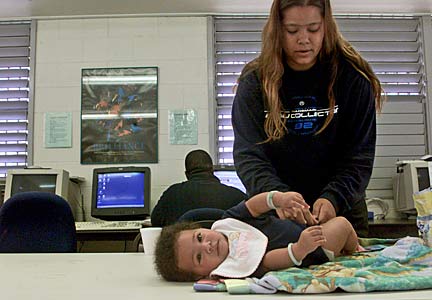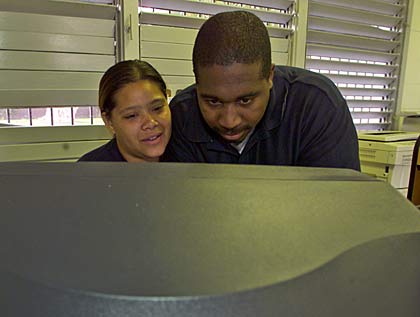|

|
Housing boom leaves
some residents on street
Even people with jobs face
homelessness due to soaring
prices and smaller inventory
Arthur Petty and Christine Mello might be homeless, but they're no bums.
|
|
But jobs and desire are no guarantee of finding shelter in Hawaii's tight real estate market, and the little green Ford Escort has instead become home to the couple and their 7-month-old daughter, Dejah.
"All we need is to get an apartment, nothing fancy. But $6.25 an hour won't pay for that," said Petty, 23, who parks the family car at garbage-strewn Waiahole Beach Park every night.
The young family moved to Hawaii from California in March to be near Mello's sister, but her overcrowded relatives had no room for them.
Now, they are among the losers in a real estate boom that is leaving some of the most vulnerable sectors of society behind.
A study by the University of Hawaii's Center on the Family estimated the state's homeless population at 13,000, but homeless agencies say those numbers are swelling.
"People are getting priced out of the market left and right. They're just suddenly out of luck," said Laura Thielen, executive director of the Affordable Housing and Homeless Alliance, who adds that growing numbers are showing up at homeless shelters or staying in parks or cars.
Hundreds of condo and apartment owners have sold recently to capitalize on high prices, reducing available rental inventory and driving up rents.
This is worsening the already considerable challenge homeless agencies face in getting existing homeless people off the streets or out of shelters, which already have long waiting lists.
In addition, homeless agencies are increasingly worried about a perceived rise in the "hidden homeless" -- people forced to crowd in with relatives due to the high costs, or families on the verge of eviction.
Such people -- estimated in a separate 2003 survey at 228,000, nearly one-fifth of the state population -- are often just one financial setback away from homelessness, said Lynn Maunakea, executive director of the Institute for Human Services.
"Those numbers are huge. I don't even want to go there," she said. "We have our hands full already with the homeless."
The situation is exacerbated by stagnant funding for programs that aid the homeless or at-risk renters.
In particular, the federal housing subsidies known as Section 8 vouchers, which typically provide qualifying low- income families with up to several hundred dollars in rent aid per month, do not go as far these days.
A Section 8 voucher also bears a stigma in the eyes of landlords who typically have many other hopeful applicants to choose from.
"People work hard to get a voucher, and then they can't find anything," said Darlene Hein, program director for Care-A-Van at the Waikiki Health Center.
And in a perverse twist, a recent federal rule change effectively punishes Hawaii for vouchers that are not used. Starting this year, annual funding levels are based on the previous year's usage. As a result, Section 8 funding for housing assistance payments slipped to $74,489,299 this year, from $75,282,478 in 2004.
"Unless funding were to actually increase significantly, then we're really looking at a guaranteed reduction in the program -- a downward spiral -- because housing prices are going up so much," said Gary Iwai, administrator of Honolulu's Community Assistance Division.

Christine Mello tended to her daughter, Dejah, at the Honolulu Community Action Program in Kahaluu. 
Above, Mello and Arthur Petty checked their e-mail at the facility, which provides help for at-risk homeless families. "All we need is to get an apartment, nothing fancy," Petty said.
But since overall funding has not grown, that means fewer people are benefiting.
"Higher property values are great for the economy and property holders, but renters are really struggling. They can't keep up," he said.
Confused and a little angry, Petty and Mello nevertheless remain hopeful.
After showering at the beach each morning, they show up daily at the Kahaluu office of the Honolulu Community Action Program to check e-mail and job and rental ads, and make phone calls.
"We've got to find something soon," said Petty, cradling Dejah.
He then gestures down the beach at nearby homeless persons whom he suspects of using "ice."
"I'm here, but I don't want to end up there," he said.
Where To Get Help
The following agencies provide homeless services on Oahu. More information can be obtained by calling the Aloha United Way's 211 hotline.
Emergency and transitional shelters, and other services:» Catholic Charities Hawaii (528-5233) 712 North School St., Honolulu» Hale Kipa (589-1829) 2146 Damon St., Honolulu » Institute for Human Services (845-7052) 546 Ka'aahi Street, Honolulu » Safe Haven (524-7233) 41 S. Beretania St., Honolulu » Steadfast Housing Development Corporation (599-6230) 677 Ala Moana Blvd., Suite 713, Honolulu » Weinberg Village Waimanalo (259-6658) 41-490 Saddle City Road, Waimanalo Outreach services» Kalihi-Palama Health Center (537-1777) 766 North King St., Honolulu» River of Life Mission (524-7656) 101 N. Pauahi St., Honolulu » Waikiki Health Center (922-4790) 277 Ohua Ave., Honolulu » Waianae Coast Comprehensive Health Center (696-1586) 86-260 Farrington Highway, Waianae » Waianae Community Outreach (668-4880) 87-728 Farrington Highway, Waianae Rental assistance» Salvation Army, Family Services Office (845-2544) 810 North Vineyard Blvd., #9, Honolulu
|
[News] [Business] [Features] [Sports] [Editorial] [Do It Electric!]
[Classified Ads] [Search] [Subscribe] [Info] [Letter to Editor]
[Feedback]
